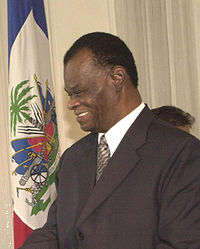Boniface Alexandre
Boniface Alexandre | |
|---|---|
 | |
| Provisional President of Haiti | |
| In office February 29, 2004 – February 16, 2006 | |
| Prime Minister | Yvon Neptune Gérard Latortue |
| Preceded by | Jean-Bertrand Aristide |
| Succeeded by | René Préval |
| Personal details | |
| Born | July 31, 1936 (age 71) |
Boniface Alexandre (born 31 July 1936) was the acting president of Haïti from 2004 to 2006. Following the departure of President Jean-Bertrand Aristide on February 29, 2004, Alexandre, as the Chief Justice of the Supreme Court and therefore next in the presidential line of succession, assumed the office of president.
Alexandre was raised by his uncle, former Haïtian Prime Minister Martial Célestin. He was trained as a lawyer and worked for 25 years for Cabinet Lamarre, a Port-au-Prince law firm specializing in business contracts and divorce settlements.
In the 1990s, Alexandre was appointed to Haïti's Supreme Court, and in 2002, President Jean-Bertrand Aristide appointed him Chief Justice. As Chief Justice, he had a reputation for fairness in a judicial system widely regarded as corrupt. He promised to fight incompetence and corruption in the courts of Haïti.
On April 25, 2003, Alexandre was made an honorary citizen of Lafayette, Louisiana, U.S.. Alexandre also teaches at the University of Port-au-Prince.
Alexandre left office on May 14, 2006, when René Préval, winner of the February 2006 presidential election, was sworn in as president.
Acting presidency
Boniface Alexandre assumed the presidency of Haïti a few hours after the removal and exile of President Jean-Bertrand Aristide, who left the country in the face of an internal uprising and international pressure. Alexandre was sworn in on the morning of February 29, 2004 in a brief ceremony at the home of Prime Minister Yvon Neptune.
Although Alexandre held the position of acting president, the Haïtian constitution (in article 149) called for him to be confirmed by the Haïtian parliament, which had not met since January 2004, when the terms of most legislators expired. Under the Haïtian constitution, new presidential elections must be held between 45 and 90 days after Aristide's resignation, and Alexandre as acting president would not be allowed to run in those elections. Furthermore, he has made known his personal unwillingness to remain any longer than necessary as interim president, as has the interim Prime Minister, Gérard Latortue, concerning his own unwillingness to reside any longer as head of government.
Although Alexandre had close ties to former President Aristide, he was not a member of Aristide's Lavalas party. Following his assumption to the presidency, political opponents of Aristide suggested that he was too closely associated with the previous regime, and that, as Chief Justice, he was not active enough in declaring the court's independence from the executive branch of the government.
One of Alexandre's first acts as president was to submit an official request to the United Nations Security Council asking for a multinational peacekeeping force to restore order in Haïti. The Security Council quickly approved this request.
Although rebel leaders, including Guy Philippe, indicated their willingness to work with Alexandre as acting president, U.S. officials initially played down Alexandre's importance in the resolution of the Haïtian conflict, calling Alexandre's administration a "caretaker" government.
Alexandre was officially inaugurated as president on 8 March. In his first presidential speech, he called for "national reconciliation, the establishment of a climate of peace and security for all and an emergency plan to counter hunger and poverty and to improve health." Gérard Latortue was named prime minister of Haïti by the Council of Sages, a committee of prominent Haïtians, on 10 March, replacing Yvon Neptune.
During his interim presidency, Alexandre's 16-month-old granddaughter, Charlotte Alexandre, accidentally drowned in a bathtub at the presidential palace while visiting from France with her family. Alexandre has four children.

